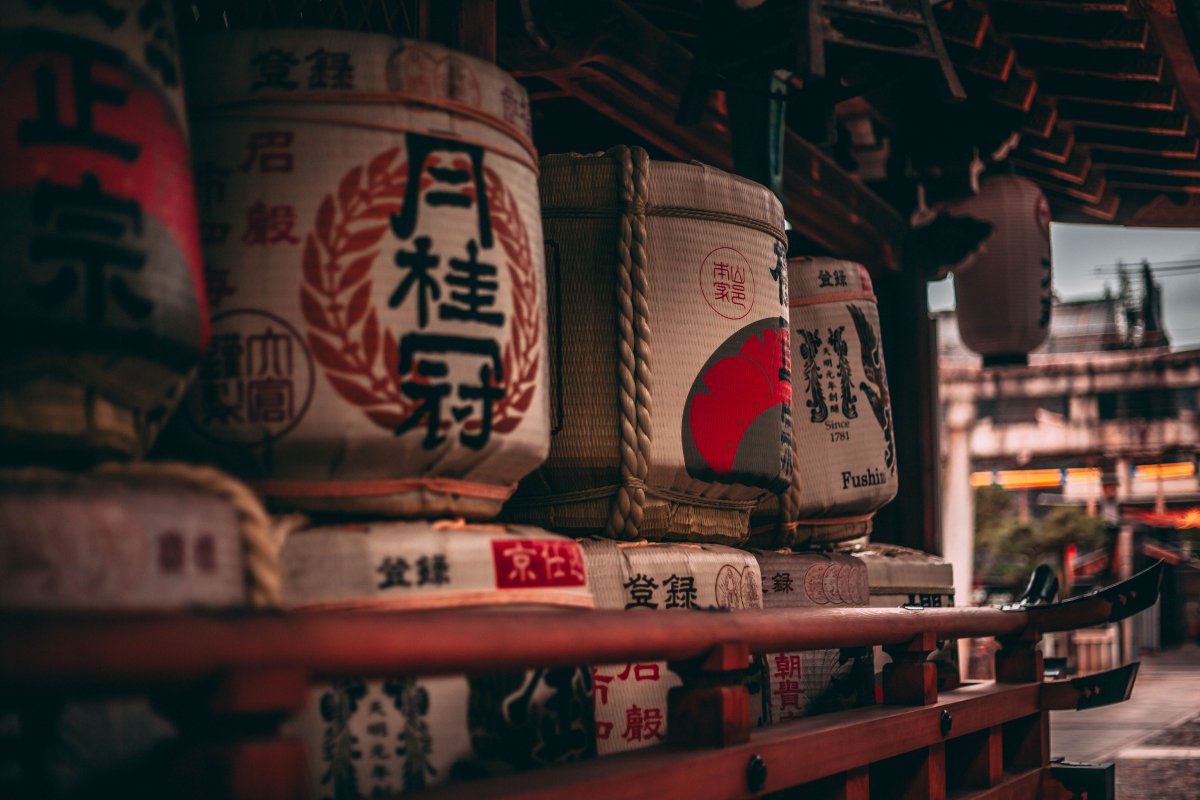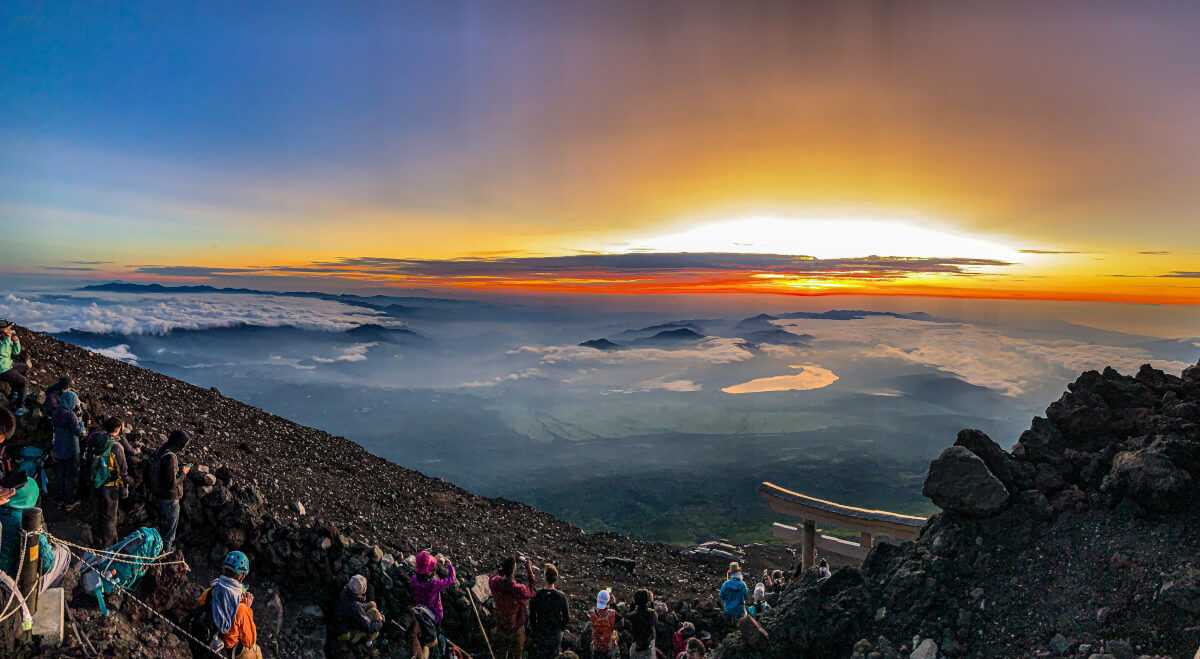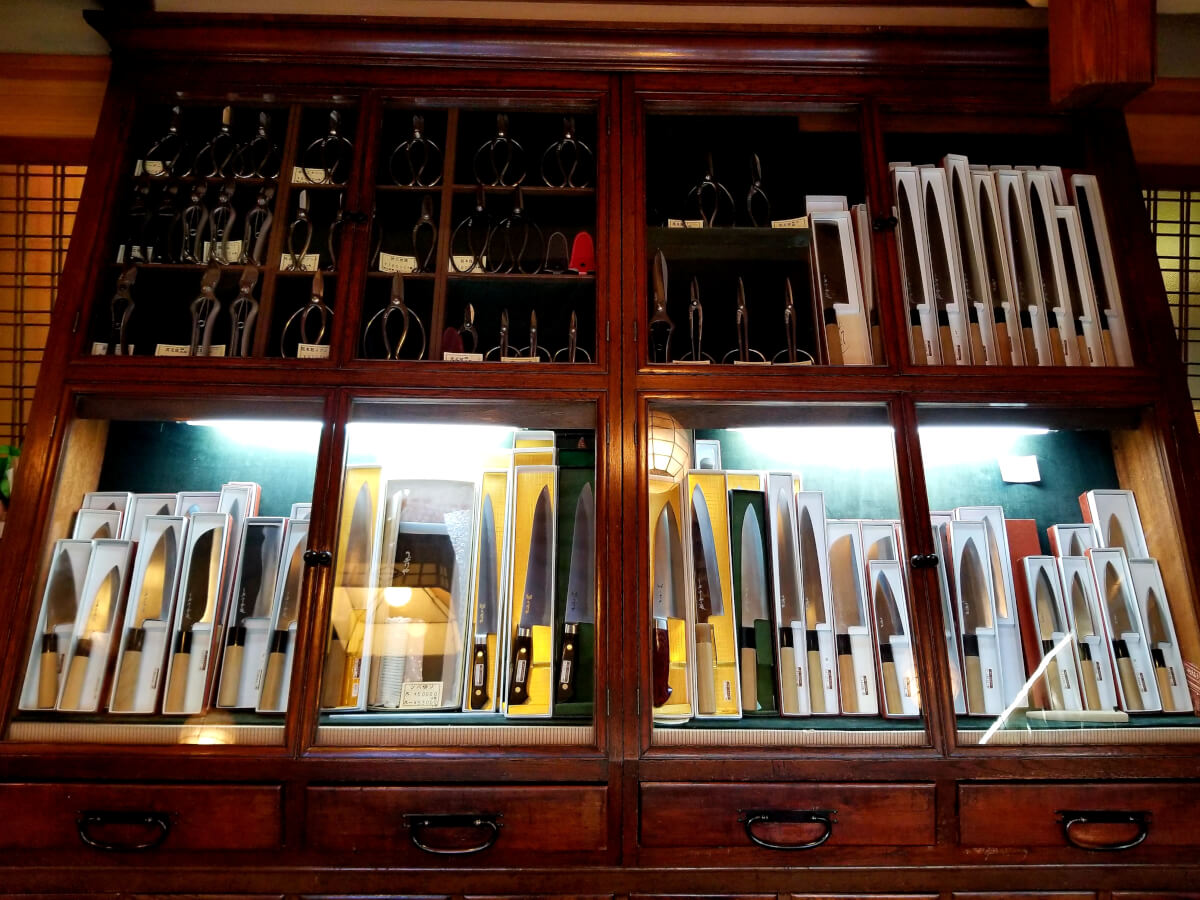Rice is an important part of the Japanese culture. Japanese people like to eat rice and they eat it almost every day. Also you have probably heard of the Inari shrines that are dedicated to Inari, a popular deity associated with… rice. Another famous Japanese product that is made of rice is sake, an alcoholic drink produced from fermenting rice.
During the brewing process the rice is polished, one of the most importants steps of the production of sake. On every sake bottle you will find a percentage, this is the so-called seimaibuai or the rice polishing ratio. This number indicates how much of the rice remains. The lower the number, the more exclusive and more expensive the sake is (and also the better taste is has we think). Next to the seimaibuai, the quality of water is decisive for the taste of sake. This is why the breweries are usually located in the countryside.
Nowadays, sake is a really popular alcoholic drink all around the world. In general, sake goes well with fish dishes, but you should carefully choose different types of sake depending on the type of cuisine. To understand more about sake, we highly recommend you to visit a, or maybe multiple, sake brewerie(s) in Japan. In this article, we introduce you 10 sake breweries that are not far from Tokyo and can be visited as a day trip. Most breweries also offers tours and tastings, so, if you are planning to stay in Tokyo, consider visiting these sake breweries!
- 1. Toshimaya Shuzo Brewery (Higashi-Murayama, Tokyo)
- 2. Ozawa Brewery (Sawai, Tokyo)
- 3. Ishikawa Brewery (Fussa, Tokyo)
- 4. Ide Brewery (Fuji Kawaguchiko, Yamanashi)
- 5. Bukou brewery (Chichibu, Saitama)
- 6. Shichiken Brewery (Kofu, Yamanashi)
- 7. Matsuoka Brewery (Hiki, Saitama)
- 8. Yokota Brewery (Gyoda, Saitama)
- 9. Tamura Brewery (Fussa, Tokyo)
- 10. Nakamura Brewery (Akiruno, Tokyo)
- Other articles that you might like:
1. Toshimaya Shuzo Brewery (Higashi-Murayama, Tokyo)
Located on the outskirts of Tokyo, Toshimaya Shuzo has over 400 years of history. This brewery is using spring water from Mt. Fuji to produce its sake. Despite being one of the oldest breweries in Tokyo, Toshimaya has been developing its brewery technologies to stay abreast of modern technologies. Japanese people drink sake to celebrate weddings, a tradition that was started for the first time by this brewery a long time ago with Kinkon sake which literally means ‘golden wedding anniversary’. This brewery is also the father of Okunokami, the local Tokyo brand only sold to sake specialists in Tokyo.
Toshimaya Shuzo Brewery (Japanese only)
Tours are available, reservations required.
2. Ozawa Brewery (Sawai, Tokyo)
Established in 1702, Ozawa Brewery named its sake brand Sawanoi as it is located in the Sawai area. In Ome city to be precise, which is famous for its clear water. The brewery is located just 3 min away from Sawai station, a 1h40m train ride from Tokyo station. Next to sake, this brewery also makes tofu.
Tip: If you want to try some sake, the brewery offers kiki-zake, a sake tasting of 10 kinds of sake.
Ozawa Brewery
Free tours both in Japanese & English
Recommended Tour
World Champion Sake Brewery in Ome (West Tokyo) Tour
300 years old Ozawa Brewery is the sake brewery that won the French Kura Masters Sake Contest’s President Prize 2021. The guide who happens to be a friend of the head of the brewery will take you to that renowned brewery where you can learn the secret of making great sake, try several sake tastings, and have lunch at a riverside restaurant. Before visiting the brewery, you will stop by Gyokudo Art Museum with a beautiful Japanese garden.

3. Ishikawa Brewery (Fussa, Tokyo)
Ishikawa Brewery spent over 120 years producing their excellent sake called Tamajiman. They cherish their local society as all the ingredients used to make this sake are locally sourced. The tour around the premises is offered in French and English. There is also an Italian and a Japanese restaurant next to the brewery where you can have lunch after visiting the brewery. It takes 110 mins from Haneda airport and 150 min Narita airport by train to get to the brewery.
Ishikawa Brewery
Free tours available in English & French, reservation required.
4. Ide Brewery (Fuji Kawaguchiko, Yamanashi)
Ide Brewery has been making sake using water from Mt. Fuji, the tallest mountain in Japan, for over 180 years. If you decide to visit this brewery, you will not need to worry about Japanese language because they can guide you through the brewery in English as well. Before or after the tour, you can visit the historical Japanese rooms and garden, located next to the brewery. They can book the brewery tour on their website.
Ide Brewery
Tours available in English, reservation required.
Admission fee: ¥800 (including sake tasting)
5. Bukou brewery (Chichibu, Saitama)
Bukou brewery is located in Chichibu city, which is famous for its clean well-water that is essential for them to make sake. During the tour you will also see the old well that sourced the water. Bukou also produces Amazake, a sweet and low-alcohol sake. If traditional sake is too strong for you then Amazake is a great alternative.
Bukou Brewery (Japanese only)
Free tours available, reservation required.
6. Shichiken Brewery (Kofu, Yamanashi)
Located in Hakushu city, Shichiken brewery has over 270 years of history. They have been using local rice and water to produce sake throughout the years. Interesting fact: they also make sparkling sake, and produce three different types: Mori no kanade (profound rich clear type), Hoshi no kagayaki (elegant crystal type) and Yama no kasumi (light cloudy type). The brewery also runs a restaurant called Daimin where you can taste and enjoy Hakushu’s local food.
Shichiken Brewery
Tours available, reservation required.
7. Matsuoka Brewery (Hiki, Saitama)
Their sake has been No.1 Gold Winner Sake Brewery of the National Sake Awards consecutively for 8 years. The name of this prestigious sake is Mikadomatsu which literally means emperor (Mikado) and Japanese pine tree (Matsu). During the brewery tour, you can drink the water that they use for making this sake. Once you taste it, you will understand the high-quality of the water.
Matsuoka Brewery
Free tours available, reservation required.
8. Yokota Brewery (Gyoda, Saitama)
Shouemon Yokota, the founder of Yokota brewery, sought clean water for making sake and found it in Gyoda city where he established the brewery in 1805. They order Asano-hikari and Wakamizu brown rice and polish it. As the quality of the rice is slightly different every year, they need to carefully polish it manually.
Yokota Brewery (Japanese only)
Tours available, reservation required.
9. Tamura Brewery (Fussa, Tokyo)
This sake brewery has been making sake according to their family motto “making sake with great care and selling it with respect” for almost 200 years. The Tamura family used to be village heads of Fussa city and established Tamura Brewery in 1822. The brewery is still family-run with a 16th generation CEO in charge. Their signature sake is Kasen, which means “pleasure fountain”. A free one-hour sake brewery tour is available at the brewery (only in Japanese), but you need to book it in advance.
Tamura Brewery (Japanese only)
Free tours including sake tasting are available, reservation required.
10. Nakamura Brewery (Akiruno, Tokyo)
The Nakamura family has been living in the Aki river area and started brewing sake over 200 year ago, in the Edo period. Chiyotsuru is the name of the sake they make which is translated as “the crane of a thousand ages”. Named after the many cranes that were living in the area. This brewery uses traditional and modern storehouses to make the sake. In addition to the brewery tour, we recommend you to visit the attached sake museum where you can see many traditional tools used for making sake. Also you can sample sake here!
Nakamura Brewery (Japanese only)
Tours available, reservation required.
When people think of a sake brewery, they often picture a remote place in the rural area, surrounded by natural scenery. While this is the case sometimes, cities such as Tokyo are also home to several breweries. Many of these sake breweries have a long history, but they are adapting to the modern era by introducing new technologies. It is definitely interesting to see how they combine traditional and modern brewing methods at their historical breweries. At all of the breweries mentioned in the article, tours are available during which you will learn more about the brewing process and the taste of sake. Last important note before you go: don’t drive a car when you visit one of these sake breweries, otherwise you’ll miss out on the best part – we think – the sake tasting!
Follow us on Instagram or Facebook for more travel inspiration. Or tag us to get featured!
Happy travelling!





Comments
This article said rice politing ratio “eimaibuai”. This is wrong.
“Seimaibuai” is right.
Seimai is to polite.
Buai is the ratio.
Enjoy Japan culture😆
Seimai is to polish.
Thank you for pointing our typo out, Important to get the information right. We have updated the article :)